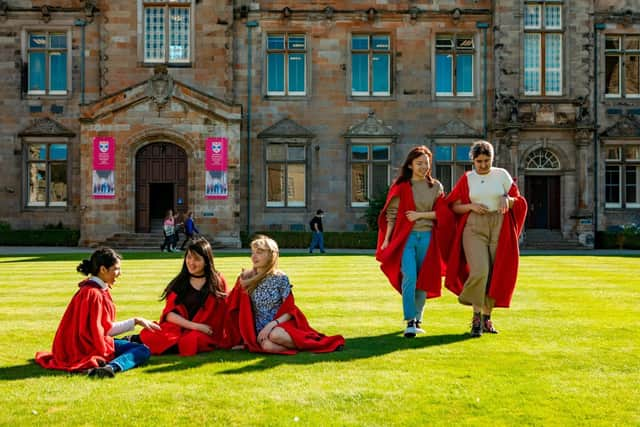Students are lacking in key social skills, says top Scottish university
The University of St Andrews said there have been "observable dips in levels of initiative or comfort at trying out new things".
The body said this was potentially due to months of lockdown.
Advertisement
Hide AdAdvertisement
Hide AdRosalyn Claase, the university's director of student experience, said general life skills were "probably less developed than in previous cohorts".


She made the comments in evidence submitted to a Holyrood inquiry into the health and wellbeing of children and young people.
A university spokesman said the trends were "observable pre-pandemic", but had been exacerbated by Covid.
In a written submission on behalf of the university, Ms Claase said: "We notice that students are lacking in some key social skills, for example how to build and retain new friendships, potentially retreating more into digital spaces rather than meeting new people in person.
"There are observable dips in levels of initiative or comfort at trying out new things and being able to develop as an independent learner, potentially due to the months of lockdown inhibiting elements of personal and social growth and development.
"General life skills are probably less developed than in previous cohorts, leading to higher levels of anxiety which tends to fall under the category of mental health/wellbeing."
Ms Claase said financial challenges relating to the pandemic included the loss of parental income and traditional summer work, which had likely led to fewer students "having the opportunity to generate income for themselves/support living costs, and decreasing the sense of forging some independence".
A university spokeswoman said: “These trends were observable pre-pandemic, but Covid and its effect on opportunities for normal in-person interactions have exacerbated them.
Advertisement
Hide AdAdvertisement
Hide Ad"This is, of course, a society-wide problem which has its roots in the convenience of digital technology and the relative lack of life skills training before young people leave home.
"Universities, however, inherit the challenges manifested by these phenomena, and we have to act to address them.
“It’s one of the reasons why it’s so important that our universities are supported to return to normal in-person teaching, and the natural social interactions which happen around students going to lectures together.
“St Andrews was the first university in the UK to launch a pro-active 'can do' programme during the pandemic to enable more in-person extra-curricular contact during lockdown. Through our principal’s strategic fund we are now targeting and investing in student-society led ideas and activities, which bring people into contact with people, and we have a 'halls life' programme to help new students with community building activities.”
Anna-Ruth Cockerham, director of wellbeing and equality at the University of St Andrews Students' Association, said it "recognised the increasing difficulties that students have building relationships and with their mental health, largely motivated by the pandemic".
She said: "Restrictions have left students unable to meet in-person and after two years struggling to maintain the level of social interaction they have in the past online.
"We have taken a number of steps to support students throughout the pandemic, including supporting the peer support network, which offers one to one student-led support, and the student mental health agreement in partnership with the university.”
Comments
Want to join the conversation? Please or to comment on this article.

